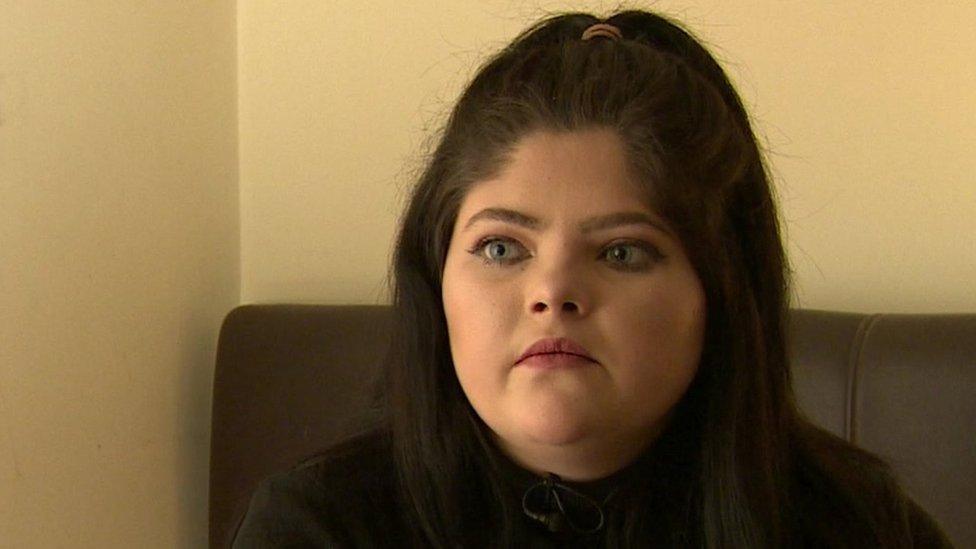Pay us fairly for our overnight shifts, care workers say
- Published

"You 100% have to be on top form all the time because if something happens, you're in charge."
Victoria Bell is at the start of an overnight "sleep-in" shift, caring for two people with learning disabilities in a house in Doncaster.
A long-running battle over care-workers' pay will reach the Supreme Court on Wednesday.
Victoria, 23, is very clear the work she does should be better valued and better paid.
She gets the minimum wage for the nights she sleeps in - but many workers on similar shifts are paid a much lower flat rate.
"People say, 'Oh, you actually sleep at work?'
"You do sleep sometimes but you're always at work. It's not like you can get up and leave to go anywhere else."
She shows the staff bedroom - small, with plain walls, a single bed and filing cabinets.
"We've got a phone there in case there is an emergency and the service users bedrooms are just next door."
There are alarms in their rooms and once one goes off "you're awake for them", she says.
Back pay
Unions argue all care staff should receive the minimum wage for night shifts even if they are asleep.
One of the two cases being considered by the Supreme Court is against Mencap, the learning disability charity.
Thousands of workers will be affected and organisations providing care fear if they lose, they could be liable for millions of pounds in back pay, which they say they cannot afford.
Philip Bartey who runs Autism Plus, Victoria's employer, says its bill alone could be £2.5m
"The funds are not there," he says.
Mr Bartey says the squeeze is due to councils and the NHS not paying care companies the minimum wage for providing sleep-in care at the homes of older or disabled people who might need help.
Victoria Bell, 23, with Emma, one of the people she helps care for
Unison brought the legal action on behalf of a Mencap care worker paid less than £30 for working a shift from 22:00 to 07:00.
She was expected to keep a "listening ear" out in case the people she was there to support needed help, otherwise she could sleep.
Over 16 months, she was called on six times at night, receiving no extra money for the first hour she was disturbed, although after that she was paid at the full day-time rate.
The High Court ruled even when she was asleep she was entitled to the minimum wage for the shift.
That was overturned in the Court of Appeal and now the Supreme Court will be expected to settle the matter once and for all.
'Chronically underfunded'
Mencap says it now ensures staff are paid the minimum wage for sleep-in shifts.
"We would dearly like to pay our hard-working colleagues more," the charity says.
But it is defending the case, it says, as, if the Court of Appeal ruling is overturned, tax officials will expect it and other care providers to pay care workers past and present six years of back pay, which "would run into hundreds of millions".
Mencap says such a bill could make the care they provide unviable and wants the government to step in," the charity says.
"Social care is chronically underfunded and many providers are warning that this could tip them into insolvency.
"If back pay is owed, we believe the government should pay it."
TUC head of employment rights Kate Bell says: "Governments for a long time have been talking about sorting the social-care crisis.
"This is the point where they really have to step in and help out.
"We just can't have the situation where we're saying either low paid workers don't get paid or people don't get the vital care they need. That's not tenable."
A spokeswoman said the government would pay "close attention" to the outcome of the case.
She added: "Workers in the sector should be fairly rewarded for what they do and we encourage employers to pay more than the minimum wage where possible; we hope more care-sector employers will consider doing so."